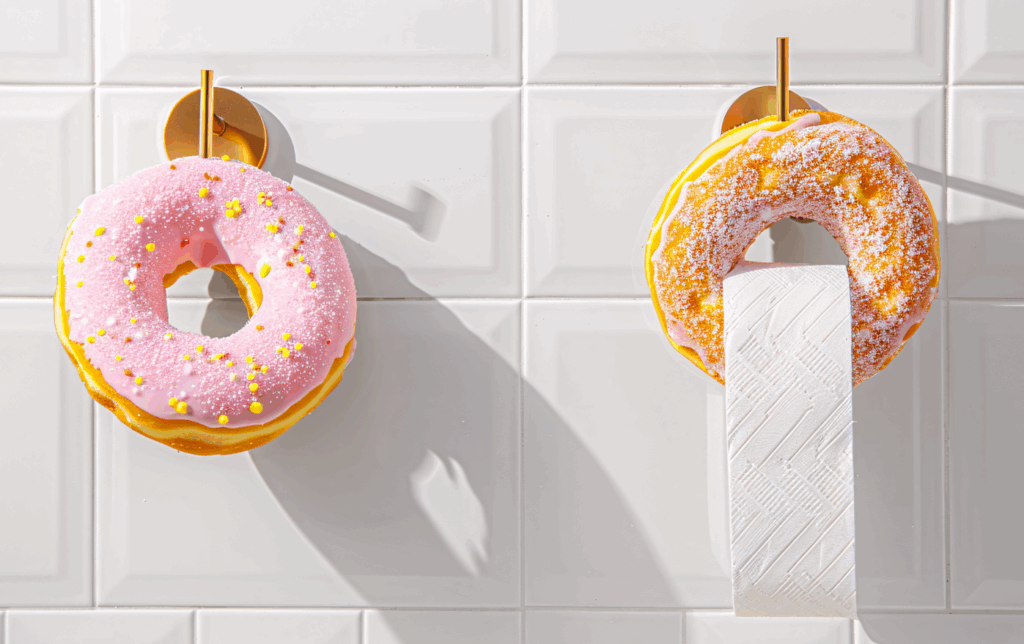Your daily bathroom routine is basically sending you text messages about what’s happening inside your digestive system, and you might be missing some pretty important updates.
I know, I know. It’s not exactly dinner party conversation material. But stick with me here, because understanding these daily signals could be the key to feeling more energetic, comfortable, and just plain better in your own skin.
Your Gut is More Like a Chatty Best Friend Than You Think
Think of your digestive system as that friend who always has something to say. Sometimes it whispers, sometimes it shouts, and occasionally it throws a full-on tantrum. The thing is, a healthy gut influences every aspect of your well-being, from energy levels and sleep to mood stability, so it’s worth learning to decode what it’s trying to tell you.
Your bathroom routine isn’t just about… well, the obvious. It’s a daily check-in with your body’s most complex ecosystem. And just like any good relationship, the more attention you pay, the better things tend to go.
The Daily Detective Work: What to Actually Look For
Here’s where things get interesting (and slightly less awkward to discuss). Your bathroom habits are basically a daily report card from your digestive system. Your bowel habits are a strong indicator of your digestive health, and paying attention doesn’t require a medical degree—just a willingness to notice patterns.
Timing is Everything
First up: frequency. And before you start comparing yourself to your roommate or that health blogger on Instagram, here’s some reassuring news: a typical, “healthy” frequency of bowel movements might range from three times a day to three times a week. Yes, you read that right. The range is pretty wide, and what matters most is consistency within your own normal pattern.
If you’re suddenly going from once a day to once a week, or from every few days to multiple times daily, that’s when your gut might be trying to get your attention. It’s like when your usually punctual friend starts showing up late to everything—something’s probably up.
The Shape of Things
Now for the part that might make you slightly uncomfortable but is surprisingly important: the appearance factor. The healthiest shape for poop is a long cylinder, and healthy bowel movements should be smooth, firm, and easy to pass.
Think of it this way—your digestive system has been working on this particular project for about 24-72 hours, moving things along, absorbing nutrients, and managing the whole complex process. The final result tells a story about how well that system is functioning.
When things are running smoothly, you shouldn’t need to strain, spend ages in the bathroom, or feel like you’re incomplete afterward. It should be more like a quick, efficient transaction—kind of like using a well-designed app.
Beyond the Basics: Other Clues Your Gut Sends
Your bathroom routine includes more than just the main event. There are other subtle (and not-so-subtle) signs that your digestive system uses to communicate.
The Comfort Factor
How do you feel during and after? If you’re spending half your morning in the bathroom scrolling through your phone because things just aren’t happening, or if you feel like you’re never quite finished, your gut might be hinting that something in your routine needs tweaking.
On the flip side, if everything feels effortless and you walk away feeling light and comfortable, that’s your digestive system giving you a thumbs up.
Energy and Mood Connections
Here’s something that might surprise you: your bathroom routine can actually influence how you feel for the rest of the day. When your digestive system is running smoothly, you’re more likely to feel energetic and clear-headed. When it’s struggling, you might notice you feel sluggish, bloated, or just generally “off.”
This isn’t just coincidence. Digestive system problems such as heartburn, gas, bloating and constipation reflect what’s happening throughout your body. Your gut and your brain are in constant communication, so when one isn’t happy, the other often knows about it.
The Lifestyle Connection: Small Changes, Big Differences
The beautiful thing about your digestive system is that it responds to the choices you make every day. Unlike some aspects of health that feel completely out of your control, your gut health is remarkably responsive to lifestyle adjustments.
Hydration: The Underrated Hero
Water isn’t just for feeling virtuous with your cute water bottle. It’s actually essential for keeping everything moving smoothly through your digestive system. When you’re dehydrated, things can get sluggish and uncomfortable pretty quickly.
Try this: notice how your bathroom routine changes when you’re really good about drinking water versus when you forget about it for days. The difference might surprise you.
Movement Matters
Your digestive system loves it when you move your body. It doesn’t have to be intense—even a walk around the block can help things along. Think of physical activity as a gentle massage for your internal organs.
Many people notice that their most comfortable bathroom routines happen when they’re consistent with some form of daily movement. It’s like your gut is saying “thank you” for not making it do all the work alone.
Stress: The Gut’s Biggest Nemesis
Here’s something that might hit close to home: stress and your digestive system are not friends. When you’re stressed, your body diverts energy away from digestion, which can lead to all kinds of uncomfortable situations.
Ever notice how your bathroom routine goes haywire during stressful periods? That’s not a coincidence. Your gut is often the first place stress shows up, and it’s also one of the first places you’ll notice improvement when you find ways to manage stress better.
Creating Your Own Gut-Friendly Routine
The goal isn’t to become obsessed with every detail of your bathroom routine. Instead, it’s about developing a general awareness and creating habits that support your digestive system’s natural rhythm.
Morning Rituals That Work
Many people find that establishing a consistent morning routine helps their digestive system get into a rhythm. This might include drinking a glass of water when you wake up, taking a few minutes to sit quietly with your coffee, or doing some gentle stretching.
The key is consistency. Your gut likes predictability and responds well to routine.
Meal Timing and Your Internal Clock
Your digestive system operates on its own internal schedule, and eating at roughly the same times each day can help keep everything running smoothly. It’s not about strict rules, but rather about giving your body some predictable structure to work with.
Notice how your bathroom routine changes when you eat at wildly different times versus when you stick to a more consistent schedule. Your gut will likely have opinions about this.
The Power of Patience
In our fast-paced world, we often expect everything to happen immediately. But your digestive system works on its own timeline, and trying to rush it rarely leads to good outcomes.
Give yourself enough time in the morning for your natural routine to unfold without pressure. Many people find that reducing the stress around bathroom time actually improves the experience significantly.
When to Pay Extra Attention
While everyone’s normal is different, there are some changes that warrant more attention. If you notice sudden, persistent changes in your routine—whether that’s timing, comfort, or appearance—it might be worth mentioning to a healthcare provider.
“With unexplained abdominal pain, weight loss, blood in your stool and with a change in bowel habit, contact your doctor,” is the general guideline that medical professionals recommend.
The key word here is “persistent.” One off day doesn’t mean much, but a pattern of changes that lasts more than a couple of weeks might be worth discussing with someone who can provide personalized guidance.
Building a Better Relationship with Your Gut
At the end of the day, paying attention to your bathroom routine is really about building a better relationship with your body. It’s about noticing patterns, understanding your own normal, and making choices that support your overall comfort and well-being.
Your gut is incredibly resilient and responsive. Small, consistent changes in your daily routine can often lead to noticeable improvements in how you feel. And the best part? You don’t need expensive supplements, complicated protocols, or dramatic lifestyle overhauls to start seeing results.
Start Simple
Begin by just noticing. What time of day do you typically feel most comfortable? How does your routine change when you eat different foods, drink more or less water, or have stressful versus relaxed days?
This awareness alone can be surprisingly powerful. Once you understand your patterns, you can start making small adjustments that support your natural rhythm.
Trust the Process
Your digestive system has been doing this job for your entire life, and it’s pretty good at it. Rather than trying to control every aspect, focus on creating conditions that allow it to do its work effectively.
This might mean eating more slowly, staying hydrated, moving your body regularly, or finding better ways to manage stress. These aren’t groundbreaking strategies, but they’re the foundation of good digestive health.
The Bottom Line (Pun Intended)
Your bathroom routine might seem like the most mundane part of your day, but it’s actually a valuable source of information about your overall well-being. Digestive health is linked to many diseases, so keeping your digestive system on track is one way to prevent serious illness.
The goal isn’t perfection—it’s awareness. By paying attention to the signals your body sends you every day, you can make informed choices that support your comfort, energy, and overall quality of life.
So next time you’re in the bathroom, take a moment to appreciate the complex, amazing system that keeps you healthy and comfortable. And maybe, just maybe, listen to what it’s trying to tell you.
After all, your gut has been trying to text you every day—it might be time to start reading the messages.

Disclaimer: This article is for informational and educational purposes only and is not intended as medical advice. The content should not be used to diagnose, treat, cure, or prevent any health condition. Individual experiences may vary, and what works for one person may not work for another. Always consult with a qualified healthcare professional before making significant changes to your diet, lifestyle, or health routine, especially if you have existing health conditions or concerns. The author and publisher are not responsible for any adverse effects or consequences resulting from the use of any suggestions, preparations, or procedures described in this article.
Sources: Information in this article is based on publicly available health and wellness resources, including content from Johns Hopkins Medicine, NIH News in Health, Cleveland Clinic, and other reputable health organizations, accessed in 2025.



